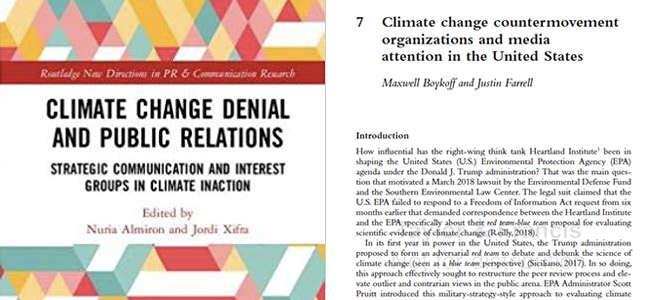
by Max Boykoff and Justin Farrell
Chapter 7 in Climate Change Denial and Public Relations: Strategic communication and interest groups in climate inaction edited by Núria Almiron and Jordi Xifra, Routledge (2019)
Introduction:
How influential has the right-wing think tank Heartland Institute been in shaping the United States (U.S.) Environmental Protection Agency (EPA) agenda under the Donald J. Trump administration? That was the main question that motivated a March 2018 lawsuit by the Environmental Defense Fund and the Southern Environmental Law Center. The legal suit claimed that the U.S. EPA failed to respond to a Freedom of Information Act request from six months earlier that demanded correspondence between the Heartland Institute and the EPA specifically about their red team-blue team proposal for evaluating scientific evidence of climate change (Reilly, 2018).
In its first year in power in the United States, the Trump administration proposed to form an adversarial red team to debate and debunk the science of climate change (seen as a blue team perspective) (Siciliano, 2017). In so doing, this approach effectively sought to restructure the peer review process and elevate outlier and contrarian views in the public arena. EPA Administrator Scott Pruitt introduced this military-strategy-style approach to evaluating climate research for policy applications, by proposing television debates to advance science in the public arena (Volcovici, 2017). Through this red team-blue team proposal (enlisting the help of the Heartland Institute), Pruitt began to identify potential contrarian scientists and economists as participants (Waldman, 2017). While a red team-blue team approach may be losing support both inside and outside the Trump administration, Pruitt has told the Heritage Foundation that there are ongoing plans to constrict climate science under the guise of reform (Wald-man & Bravender, 2018 ).
Numerous events in recent years like these have re-calibrated contrarian considerations in the public arena. Developments like these have pointed to the reality that ideological polarization around climate change issues – particularly in the United States – has increased in the last thirty years (Dunlap, McCright, & Yarosh, 2016) and that media have also played a role in this trend (Carmichael, Brulle, & Huxster, 2017). These kinds of actions have also marked novel approaches to climate change countermovement or think tank strategies to oppose various forms of science and policy engagement from the local to national and international scales (Cann & Raymond, 2018). Read more …

